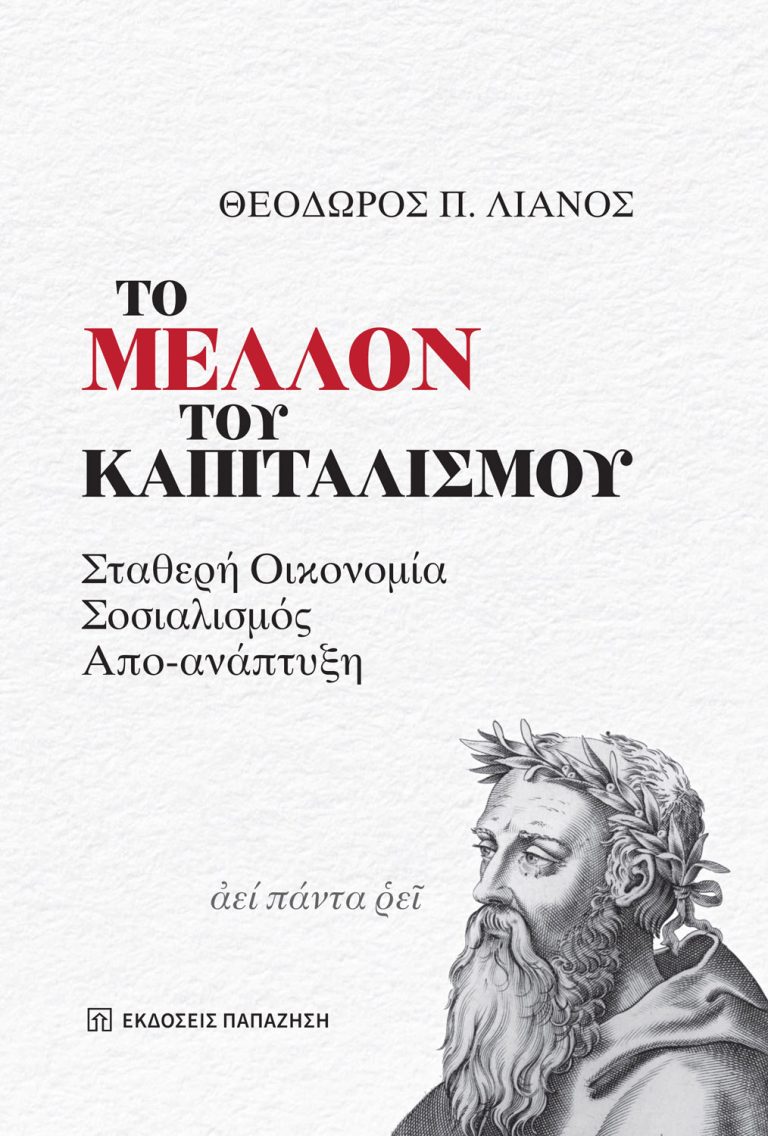Theodoros Lianos’s book manages to do two things simultaneously in a particularly good and balanced way.
On the one hand, it provides a wealth of information about the state of the global economy, the threat of climate change, and the role of social and regional inequalities. At the same time, it includes a review on the many approaches to the future of capitalism — from the relatively optimistic to the completely pessimistic — as well as other approaches to what should be done, ranging from advocates of degrowth to those supporting ecosocialism or participatory socialism. From this perspective, the book is extremely useful for students as well as the general public, who can gain an excellent first exposure to many important debates, and, by following the bibliography, explore more deeply those discussions they find most interesting.
On the other hand, the book puts forward a strong argument — or rather, a message. This is that in the entire discussion about how humanity will tackle climate change, perhaps the most crucial aspect of the problem is often forgotten: population growth. When I was born in 1960, the world population was three billion; now it is around eight, with projections to reach eleven billion soon. The FAO (United Nations Food and Agriculture Organization) estimates that by 2050, food production will need to increase by 50%, and even more so in developing countries. And this prospect is simply not sustainable.
The main problem is that available land is finite. Clearly, new technologies may increase land productivity, but there are limits to this process — that is, limits to the amount of food that can be produced. In economic terms, there are diminishing returns as more labour or capital is added to a finite resource such as land. For this reason, Lianos argues that sooner or later — and probably sooner than we think — we will face a food crisis. He predicts that possible consequences include revolutions, social unrest, wars, authoritarian regimes, and mass migration.
As with the broader climate crisis, the impacts will not be the same for everyone. For example, Lianos outlines the potential effects across three different zones. Developed capitalist countries will face price increases due to the food crisis, but since they are primarily food exporters, the impacts will be more manageable. They also have strong militaries and enforcement mechanisms to deal with possible political reactions. At the other end are developing countries that import food and lack strong militaries and enforcement mechanisms — in those places, the various phenomena the book describes will not be easy to manage. The big question mark is how China might be able or willing to react: on the one hand, it is a food importer; on the other, it has at its disposal a strong military and enforcement apparatus.
The solution Lianos proposes is the concept of a steady-state economy that ensures a good standard of living, ecological balance, and a stable population — in fact, he believes the population should shrink somewhat before stabilizing. In the simple model he presents, assuming the continuation of capitalism, this combination leads to a lower profit rate and, therefore, lower investments. The author wants to remain relatively neutral on whether the steady-state solution can be compatible with capitalism or whether one of the different versions of socialism he discusses will be needed. But when reading the book, his skepticism about the compatibility of a steady-state economy with capitalism as we know it becomes quite apparent.
The main reason, of course, is that capitalism has an insatiable appetite for profit, which means ever-increasing production and therefore ever-increasing use of non-renewable resources. Thus, part of the solution is a productive model that does not rely so heavily on profit. At the same time, changes are also needed on the consumption side. Lianos discusses the critique of consumerism from the ecosocialist perspective but says less about this issue when discussing the degrowth approach, even though it too includes a critique of consumerism. Overall, I think his presentation of the latter approach is somewhat lacking.
Theodoros Lianos taught for many years at the Athens University of Economics and Business, as did I. I would have liked to see in his book a bit more development of whether, for understanding the problem, for enabling serious public discussion, and for implementing the steady-state solution he proposes, we would need a more critical stance toward orthodox economics. It seems to me that the dominant approach to economics taught in almost all economics departments around the world — based on individualism and the maximization of individual profit — is entirely unsuitable. Or rather, to put it more clearly, orthodox economics is part of the problem.
In my own book, Manifesto for a Sustainable Society, I argue that the climate crisis can be addressed not only with a different consumption and production model but also with the return of democracy in matters of economic policy. I believe this is also what ecosocialists and degrowth advocates are saying — and essentially, so is Lianos. Lianos’s book, however, is a welcome critique for all of us who have seriously dealt with the issue of the climate crisis and how to address it. It warns us, in other words, that things are even more serious than we thought.
